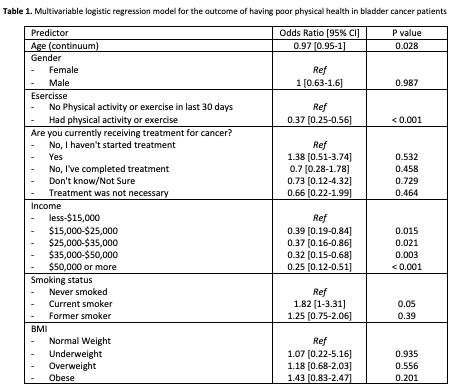Back
Poster, Podium & Video Sessions
Moderated Poster
MP42: Bladder Cancer: Epidemiology & Evaluation II
MP42-06: Impact of exercise on physical health status in bladder cancer patients
Sunday, May 15, 2022
10:30 AM – 11:45 AM
Location: Room 225
Mara Koelker*, Khalid Alkhatib, Muhieddine Labban, Mark A. Preston, Timothy N. Clinton, Steven L. Chang, Quoc-Dien Trinh, Matthew Mossanen, Boston, MA

Mara Koelker, MD
Brigham and Women's Hopsital
Poster Presenter(s)
Introduction: Little is known about behavioral habits such as exercise and its impact on the physical health of bladder cancer patients during and after their cancer treatment. In this study we aim to investigate the role of exercise on self-reported physical health status of bladder cancer patients. We hypothesized that less active patients are more likely to self-report poor physical health.
Methods: We examined cross-sectional data of participants diagnosed with bladder cancer within the Behavioral Risk Factor Surveillance System (BRFSS) between 2016 and 2020. The BRFSS is a national health related survey conducted by the Centers for Disease Control and Prevention. Patient health status was surveyed using self-reported measures (e.g.: Total days per month when “physical health is not good.”). A multivariable logistic regression model analysis (MVA) was conducted adjusting for age, gender, income, smoking status, BMI, cancer treatment and physical activity. The primary outcome was patient reported poor physical health for more than 14 days within a one-month period.
Results: Out of 2,193,981 survey participants, we identified 936 with a history of bladder cancer, only one patient did not complete the questionnaire. Approximately, 1 in 3 bladder cancer patients reported being sedentary within the last month, as a total of 307 (32.8%) patients reported no physical activity or exercise within the last 30 days. The remaining 628 (67.2%) reported being physical active or exercising within the last month for at least one day. In MVA we found that physical activity or exercise is a significant negative predictor of self-reported poor physical health status (OR 0.37, 95% CI 0.25 – 0.56, p<0.001). Patients that exercised were less likely to report bad physical health. More details are summarized in Table1. Our MVA model had a goodness-of-fit test of 0.54 with an area under the curve of 0.72.
Conclusions: Approximately, 1 in 3 bladder cancer patients report no physical activity of exercise within 30 days suggesting a sedentary lifestyle. Patients that are active are less likely to self-report poor physical health status. Implementation of physical activity and exercise programs for bladder cancer patients could be promising in improving health status and will need further investigation.
Source of Funding: MK is supported by the German Academic Exchange Service.

Methods: We examined cross-sectional data of participants diagnosed with bladder cancer within the Behavioral Risk Factor Surveillance System (BRFSS) between 2016 and 2020. The BRFSS is a national health related survey conducted by the Centers for Disease Control and Prevention. Patient health status was surveyed using self-reported measures (e.g.: Total days per month when “physical health is not good.”). A multivariable logistic regression model analysis (MVA) was conducted adjusting for age, gender, income, smoking status, BMI, cancer treatment and physical activity. The primary outcome was patient reported poor physical health for more than 14 days within a one-month period.
Results: Out of 2,193,981 survey participants, we identified 936 with a history of bladder cancer, only one patient did not complete the questionnaire. Approximately, 1 in 3 bladder cancer patients reported being sedentary within the last month, as a total of 307 (32.8%) patients reported no physical activity or exercise within the last 30 days. The remaining 628 (67.2%) reported being physical active or exercising within the last month for at least one day. In MVA we found that physical activity or exercise is a significant negative predictor of self-reported poor physical health status (OR 0.37, 95% CI 0.25 – 0.56, p<0.001). Patients that exercised were less likely to report bad physical health. More details are summarized in Table1. Our MVA model had a goodness-of-fit test of 0.54 with an area under the curve of 0.72.
Conclusions: Approximately, 1 in 3 bladder cancer patients report no physical activity of exercise within 30 days suggesting a sedentary lifestyle. Patients that are active are less likely to self-report poor physical health status. Implementation of physical activity and exercise programs for bladder cancer patients could be promising in improving health status and will need further investigation.
Source of Funding: MK is supported by the German Academic Exchange Service.


.jpg)
.jpg)